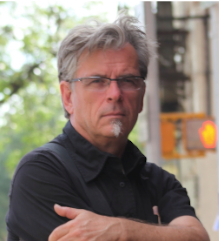Last month, Wayne Bailey was elected to head the community council for NYPD's 78th Precinct, which covers Park Slope, Prospect Park, and parts of adjacent neighborhoods. Bailey is a veteran neighborhood advocate and a long-time volunteer with Transportation Alternatives who has been involved with the precinct community council for years.
As Streetsblog readers know, under the direction of Deputy Inspector Michael Ameri, the 78th Precinct has emerged as a model for NYPD in the Vision Zero era. And as Bailey points out, Ameri was taking steps to address local street safety issues before Mayor de Blasio took office.
We asked Bailey via email about his new position, his plans for the council, and how the public can get involved to help make Brooklyn streets safer.
You were elected to the chair position, correct? How does that work?
Correction -- no chair. The bylaws' required positions are president, vice president, recording secretary, treasurer and sergeant-at-arms. [They] serve for two years and then stand for election, and then can only serve one additional two year term. To be eligible to vote you must attend four meetings, reside in the precinct or have a business interest. I was elected president at the June general meeting. [Editor's note: Joanna Oltman Smith, another name familiar to Streetsblog readers, was elected council vice president.]
I read that you've been active on the precinct council for a number of years. What motivated you to seek the [presidency]?
The community council is a conduit for communication to the precinct and from the precinct; I already am very involved in the community. I am a CB 8 board member at-large, member of the Dean Street Block Association between Sixth and Vanderbilt, and deeply involved in mitigating the quality of life construction impacts from the Atlantic Yards project. Volunteering for over six years at TA, member of the CB 8 transportation committee, [and] working with the 78th and residents on all forms of today’s traffic issues, I felt that I was highly qualified to articulate and support the mayor's Vision Zero platform and help implement that plan! The NYPD is accountable to address myriad issues, not just street safety, with the resources under their command, so it is imperative that we prioritize street safety issues that make us safest first.
What are your plans for the council, as far as street safety initiatives?
Continuing to work with DI Ameri and the 78th team developing and implementing solutions that will make for safer streets for all forms of transportation. DI Ameri is on the forefront of community policing, so he understands the importance that 78th Precinct residents put on street safety, and plans accordingly. But it’s not just about enforcement only! Outreach [from] 78th community affairs officers like Brian Laffey and DOT with local groups, like TA-Brooklyn or the Prospect Heights Neighborhood Development Council Livable Streets Committee, is an essential part of any initiative to have any real measure of success.
DI Ameri has for two-plus years addressed street safety, even before the current Vision Zero agenda. Some examples are keeping the bike lane open on Bergen Street between Sixth Ave and Flatbush Avenue with barricades, [and] reallocation of some combat parking to keep the sidewalks open to pedestrians and NYPD bike patrols. These solutions are localized but have big impacts on safety for the general public because Bergen Street is a main bike commuter arterial into Manhattan.
How can others get involved?
Attend as many of the monthly meetings as you can to bring fresh new ideas and solutions, as well as report any concerns that may have gone unnoticed. The 78th Precinct community council meets the last Tuesday of every month at 7:30 p.m. at the precinct (Sixth Avenue and Bergen Street) from September to June. There is currently a separate transportation safety meeting that starts before the general meeting at 6:30 p.m. that anyone who has an interest in street safety should attend too!






